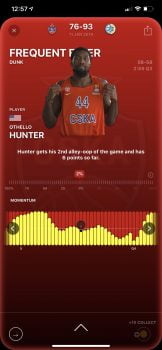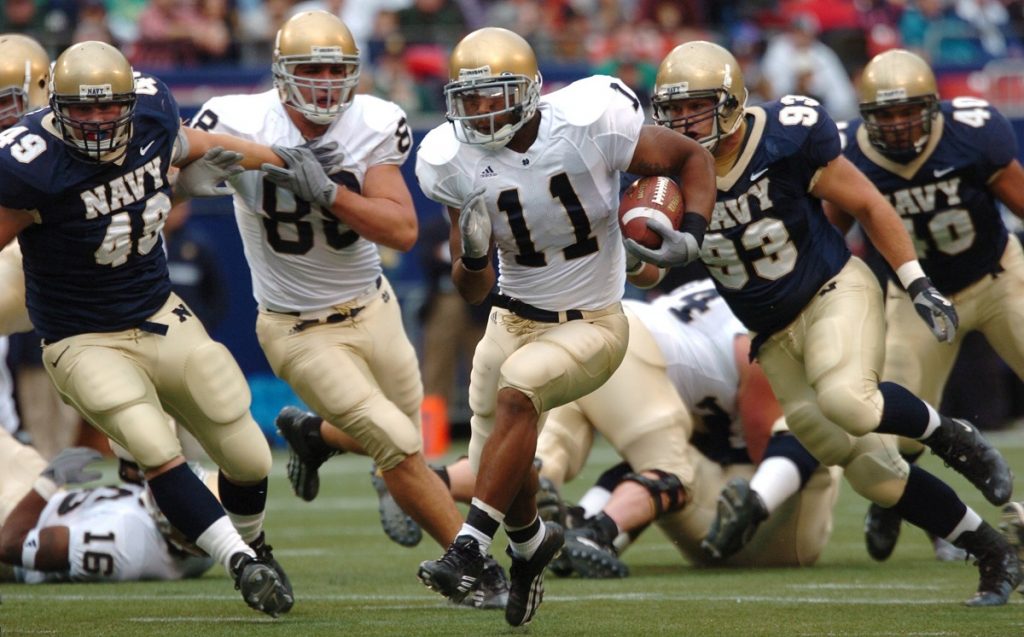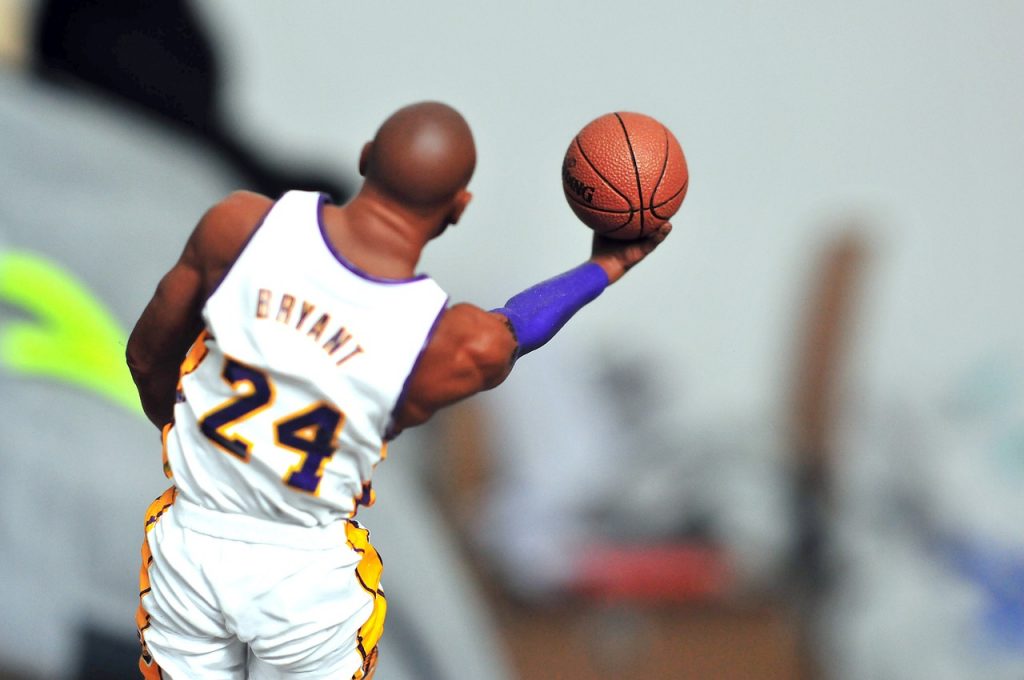Israel may not be known for producing world-famous athletes or sports dynasties, but if it’s one thing the Startup Nation excels at, it’s innovative tech. And a growing number of Israeli startups have been applying their knowledge to the multi-billion global sports industry.
In the fields of augmented reality, real-time video analysis, hydration management, movement sensors, and sports broadcasting, the number of Israeli startups active in the sports tech sector has increased dramatically over the past five years. According to a 2018 report by Start-Up Nation Central, a non-profit that tracks the Israeli tech ecosystem, Israel has over 100 companies active in sports tech.
Sports tech investor Eran Barkat tells NoCamels this is part of a “tsunami” that is storming the high-tech market. Barkat says sports tech today is mostly focusing on analyzing player performance, connecting stadiums, and engaging audiences and fans.
Jeremy Pressman, a partner at ADvantage, a $50 million fund focused on sports technology founded by OurCrowd, identified connecting athletes and optimizing the derivative sports market as emerging trends at a sports technology conference hosted at the Interdisciplinary Center Herzliya (IDC) this summer.
Companies in these areas help connect athletes to coaches or to like-minded athletes, facilitate sports betting and ticket derivatives, produce technology to upgrade stadium technology, and simplify sharing of sports content on social media and other platforms, he said.
Both Pressman and Barkat emphasized the pivotal role of AI and machine learning in sports. Automation and algorithms are taking off as ways to measure and profile player performance and optimize fan engagement while bots are playing a major role in transforming the way people consume real-time information.
NoCamels has rounded-up seven Israeli companies pushing the sports tech field forward:
Heed
Headquartered in New York City and with offices in London and Israel where it operates a development center, Heed is an internet media platform for sports transmission that uses IoT analytics and AI to deliver real-time stories, insights, and engagement with live events.
Heed developed sensor-fitted “smart shirts” worn by players to provide cutting-edge analytics about live game action in near real-time.
The startup says its platform enables fans to interact with “the emotional, physical and behavioral aspects of their favorite talent and teams to create and share their own moments.”
Heed was founded in 2015 by AGT International, a privately held technology company founded in 2007 by Israeli entrepreneur Mati Kochavi, and Endeavor, an entertainment and media agency run by Ari Emanuel (brother of former White House chief of staff to President Barack Obama, Rahm Emanuel).
In January, Heed announced a partnership with the EuroLeague Players’ Association, a union body that represents players’ rights, to allow Turkish Airlines EuroLeague players to wear Heed’s smart shirts during live games. Heed said the decision signaled the widespread support among players to leverage new technology to enhance fan engagement.
The majority of EuroLeague players across all teams are expected to wear the sensors, which are embedded into athletic compression shirts worn beneath jerseys, Heed said in a statement.
“This is incredible news for sports fans, as it signals that AI and IoT are embedding themselves into the modern sports experience in a whole new way,” said Heed CEO Danna Rabin in January. “EuroLeague players clearly understand that this is the future and we are thrilled that they are with us as we continue to change the way fans experience their favorite sports.”
Heed raised $35 million from SoftBank in October 2018.
Replay Technologies
Any discussion of Israeli sports tech is incomplete without Replay Technologies, the Israeli company acquired by American tech giant Intel for $175 million in 2016. Using 4K cameras installed in stadiums, Replay Technologies has created “free dimensional,” or “freeD” video rendering that allows viewers a 360-degree view of any shot. This technology allows stadiums to deliver high-res, high-tech footage that is more exciting and captivating for audiences.
Intel has incorporated Replay Technologies into its “True View” project, which features freeD as well as other technologies, such as a camera angle allowing viewers to see the game from a player’s perspective. FreeD technology was used in the 2016 NBA Slam Dunk Contest. Since 2017, the NFL has also been using Intel 360 replay technology. In late 2016, the Spanish LaLiga became the first European soccer league to adopt the technology, installing it in the Santiago Bernabeu Stadium and using it for the first time to film an El Clasico (Real Madrid vs. Barcelona) match.
Track160
Petah Tikva-based Track160 develops sophisticated systems that track player performance and produce tactical information. The system works through a combination of tags and cameras. The tags, small enough to fit in a player’s pocket, accumulate data on player performance in passing and running as well as collisions and injuries and predict which position a player fits best. Over time, tags should accrue enough data that the cameras alone – through machine learning – will be able to do the whole job, a “pure optical” system.
Chairman and co-founder Miky Tamir said Track160’s technological sophistication and practical simplicity give it an edge. While systems for quantifying player performance do exist, Tamir said they often require cumbersome equipment that may burden players. In addition, Track160 is fully automated, with no need to man the system once the cameras are in place.
The system can help with coaching and broadcasting games, but Track160’s most unique feature, which Tamir announced at the IDC conference, is its current development of a system that converts real-time matches into video game graphics and allows users to see games through the eyes of different players and view real-time track160 analyses.
Founded in 2017, Track160 could become a serious player in most sports tech fields. It demonstrates sophisticated use of machine learning, analyzes and connects players, connects stadiums with its camera system, and engages fans with its gaming conversion feature. Tamir himself is another sign of promise; he was head of Elbit’s electro-optics department and previously helped found and build up several successful high-tech startups including Pixellot, Orad High-Tech, Sportvu, Vumii, Seambi, and SterGen.
In October 2018, Track160 signed a strategic partnership deal with the German Football League (DFL), which operates the Bundesliga and Bundesliga 2, the top two professional German soccer leagues. Several months prior, Track160 won the European SportsTech award, a top sports tech prize, at the annual Spielmacher conference in Hamburg.
Sign up for our free weekly newsletter
SubscribePlaySight Interactive
Kfar Saba-based PlaySight Interactive built an innovative cloud-based sports video and analytics platform that is now used by professional teams.
It also originated the SmartCourt” system which performs automated analytics on video captured through several HD cameras installed around a court. SmartCourts are connected to a cloud that streams and conducts analytics real-time on court activities, weighing factors like ball and player speed. Livestreams are viewable through PlaySight’s website, which offers basic free streaming as well as more advanced analytics services with paid subscriptions, and features a mobile app.
PlaySight also livestreams matches and automatically creates highlight reels for public online viewing. In addition, PlaySight offers users the ability to create their own media streaming channels with the option to monetize content, a kind of YouTube for sports. The company has offices in Israel, the US, Canada, Australia, and Europe.
In November 2018, PlaySight entered into a new multi-year agreement with the Belgian Pro Basketball League, which operates the EuroMillions Basketball League, to be its official broadcast, live streaming, and performance technology partner.
Several months prior, SoftBank Ventures invested some $10 million in the Israeli company.
Minute Media
Founded in 2011, Tel Aviv-based Minute Media is disrupting sports news consumption.
It appears to cater specifically to an audience of millennials and takes an innovative approach to “fan-generated media.” Minute Media operates through three online platforms: 90min, 12up, and DBLTAP.
Minute Media operates three sports platforms: 90min, a leading global soccer (football for non-Americans) publisher that supports 11 different languages and boasts 250 million page views a month; DBLTAP, the eSports brand focused on stories beyond the stage, and 12up, the US sports brand at the intersection of sports and pop culture which covers mostly NFL, NBA, MLB, and college sports.
Minute Media emphasizes that all its journalists are also “fans” and has a platform for users to submit opinions and reviews. Besides writing, fans can use Minute Media to create quizzes, slideshows, videos, and other content to express their views on sports. This “fan empowerment” approach sets Minute Media apart in the field of fan engagement.
Last year, Minute Media raised $17 million in a Series F funding round, bringing its total funding since 2011 to $77 million. Its investors include Goldman Sachs, Vintage Partners, Battery Ventures, Dawn Capital, and Qumra Capital.
Minute Media has offices in Tel Aviv, New York, Los Angeles, London, Singapore, Tokyo, Manila, and Sao Paolo and runs partnerships with dozens of third-party publishers, including Sports Illustrated, USA Today Sports Media Group, MSN, ProSieben, and Horizon Media.
Tokabot
According to Tokabot co-founder and VP of strategy and sales Ilan Leizgold, fans spend on average 36 minutes sports-related chats and perform 1,700 chat interactions on match days, significantly more than the six minutes and 50 match day interactions they perform through sports apps, respectively.
Kfar Saba-based Tokabot’s product is a chatbot meant to optimize fan engagement through participation in online forums. (Chatbots are a type of bot, or program designed to imitate human behavior in chat platforms.)
In the case of Tokabot, a chatbot joins a group chat on a topic in sports, usually soccer, and interacts with fans. For example, if two fans are arguing in a chat over the Messi-Ronaldo rivalry, Tokabot might chime in by automatically gathering and sending relevant data on the players, offering coupons on beers and pizzas to participants who answer a quiz or prediction correctly, or asking a participant if he/she would like to challenge another participant to a bet on a certain question.
Powered by machine learning, Tokabot achieves fan engagement through “gamification,” application of gaming principles, such as rules and points, to non-game activities, in this case chats on sports. Its presence on chat platforms precludes the need to go through an app to use it, facilitating fans’ ability to receive data on matches in real-time. Real-time interactivity and provision of a channel for fans to “settle” sports disputes mean Tokabot has real potential to increase the excitement and captivation surrounding sporting events.
Founded in 2017, Tokabot is still in early funding stages and has so far raised $500,000, partially from strategic investors. Tokabot has a program on Facebook Messenger and has plans to expand into other chat platforms, including WeChat, Telegram, and WhatsApp as well as sports other than soccer.
The startup currently has partnerships with online betting brand Bwin, Chelsea fan clubs, the German Football Association, and German broadcaster Sky Deutschland. It also took second place at the 2018 HYPE startup competition, a global platform for the sports innovation ecosystem.
FanPassTick
Getting tickets to any event, sports included, can be difficult and often requires booking months in advance. Ramat Hasharon-based FanPassTick describes itself as a “disruptive technology” that has a solution. The company takes a B2B2C approach in which FanPassTick uses machine learning to analyze the probability of a fan showing up to a game, taking into account variables like weather and winning/losing streaks. It then asks ticket holders whether they plan to arrive at a game and, if not, makes the ticket available for resale. If a ticket is resold, half the proceeds go to the original ticket holder and half to the team selling the tickets.
FanPassTick is part of the trend of technology entering the sports ticket derivative market. Rather than sweetening the deal if a certain team wins like yoonew (a now-closed New York-based startups) did, FanPassTick gives fans the option to decide not to show up at a lower cost. This gives fans more flexibility, teams higher revenues, and stadiums heightened efficiency.
FanPassTick also features a validation system to identify and reduce fraud and scalping.
Related posts

Editors’ & Readers’ Choice: 10 Favorite NoCamels Articles

Forward Facing: What Does The Future Hold For Israeli High-Tech?

Impact Innovation: Israeli Startups That Could Shape Our Future








Facebook comments